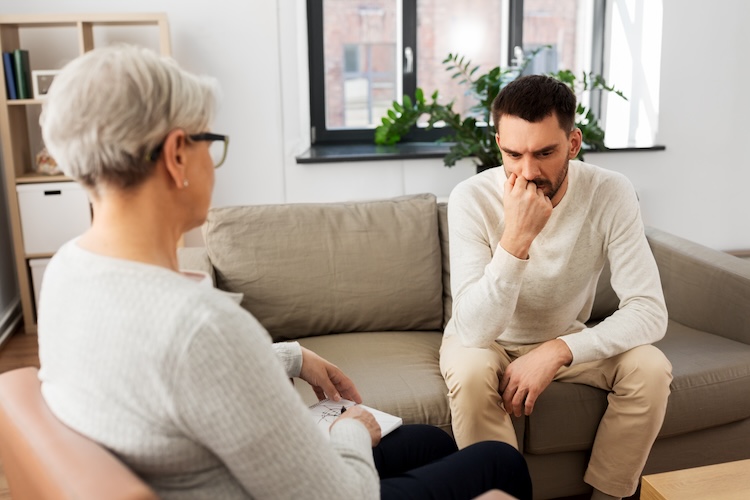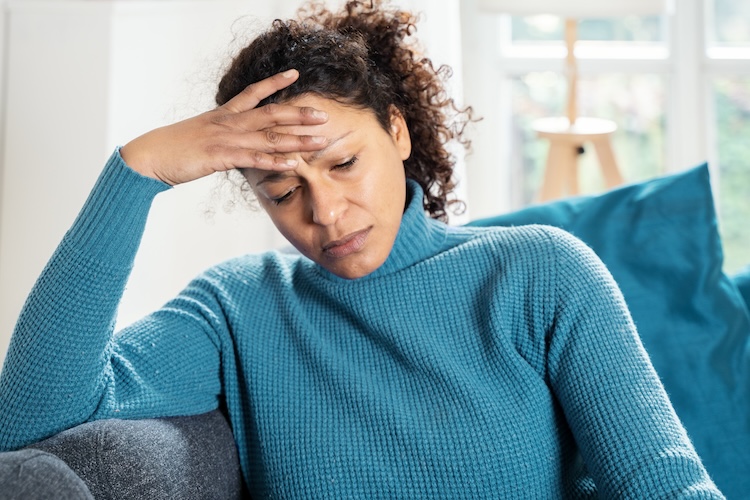Services
- Home
- Mental Health Services
- Who We Treat
- How We Treat
- Patients & Visitors
- About
close
A young woman experienced a devastating car accident. Her car was totaled, and the other driver, unfortunately, passed away on impact. Even though it was declared not to be her fault, as the other driver had been drinking and ran into her, she still felt intense guilt and shame. She even avoided driving a car and never replaced the one she totaled.
Instead, she used public transportation, disrupting her daily routine. Her guilt and anxiety began to get worse, and she was starting to feel depressed and like she was losing interest in activities that once brought her joy.
One day, a friend of hers suggested that she seek PTSD treatment, assuring her that it might make her symptoms more manageable.
In Texas, 49.6% of people treated for a mental health disorder were treated for post-traumatic stress disorder (PTSD) in 2020. This disorder can also exist alongside other disorders like depression or substance use disorders. The development of the other disorder can come to existence at any point before, after, or during the development of PTSD. At SUN Behavioral Health Houston, we solve unmet needs in our community by treating co-occurring disorders. Today we’re discussing PTSD treatment and how it can change lives.
Post-traumatic stress disorder can develop whether someone actually experienced the traumatic event or just witnessed it. These events may have been life-threatening, but they don’t always have to be considered dangerous. Some well-established events that may result in PTSD include combat, car accidents, natural disasters, or the death of a loved one, like a parent or child. However, it is essential to know that any traumatic event can result in PTSD, not just the ones listed here.
While many people may feel afraid following a traumatic situation, they will often recover from these feelings with time. However, when it comes to PTSD, the feelings of stress and fear do not go away with time, and they find themselves in a constant state of “fight-or-flight,” which is the body’s way of protecting them from anything that might be harmful. People can develop symptoms of PTSD at the moment, or the symptoms may start later on after time has already passed. No matter when PTSD symptoms appear, your experience is valid.
At any point in their lives, anyone can develop post-traumatic stress disorder. It can happen following any traumatic event. Traumatic events are not always possible to avoid, and more than likely, everyone will experience a traumatic event. However, not everyone will experience PTSD, which might make you wonder what can cause the disorder to occur.
Some risk factors may make it more likely for someone to develop PTSD. One of those factors is experiencing traumatic experiences previously or when you were a child. Also, getting hurt yourself or seeing others hurt or even killed may result in an increased risk of the disorder. If, following the traumatic event, you feel helplessness, extreme fear, or horror, there is a higher chance of PTSD. Likewise, having little to no support socially following the event, people may develop this disorder.


There can also be other circumstances that impact or add to the overall effect of the experience. These might include other stressors such as grief surrounding the loss of a loved one, personal pain following an injury, or losing your job or home because of the traumatic event. Having a history of other mental health disorders, such as depression or anxiety, or having a history of substance use disorders may result in the development of PTSD.
However, some factors may reduce the chances that you will not develop post-traumatic stress disorder following the experience of a traumatic event. While it does not bring the chances of developing PTSD down to zero, these factors do make it less likely to happen. These might include receiving support from loved ones or support groups, developing coping strategies following the event, learning to feel okay with your response to a traumatic event, and being able to feel prepared for such events despite fear.
To be diagnosed with PTSD, you have to have had symptoms for longer than a month, and they have to interfere with aspects of your daily life. These symptoms may begin within 3 months; however, these symptoms may also appear later in life. With treatment, people recover from PTSD all the time. Remember that only a mental health professional can provide an official diagnosis based on the symptoms you are experiencing. To do so, they follow the following guidelines based on at least 1 month of symptoms:
Wondering what these symptoms mean? Read on.

Thoughts, feelings, words, situations, or objects may trigger re-experiencing symptoms. These symptoms remind the person experiencing them of the traumatic event. It can include symptoms such as flashbacks. When someone is experiencing a flashback, they are reliving the traumatic event and will have physical symptoms such as an increased heart rate and sweating. They may also have recurring dreams, memories of the event, or distressing thoughts. Many times, re-experiencing symptoms will also include physical signs of stress.
Avoidance symptoms will result in the person changing their daily routines. For example, this symptom might include not utilizing cars for transportation following a car accident. These symptoms may include staying away from events, places, or objects that remind them of their experience. They may also try to avoid feelings or thoughts that relate to the traumatic event. For example, a Veteran may avert feelings of fear or sadness after they return home from a war zone because they want to create distance between themselves and the emotions they felt during deployment.
While the previous symptoms may only occur occasionally when those triggers are present, arousal and reactivity symptoms are constant. These symptoms impact their daily life and can make eating, sleeping, or concentrating difficult. They might include being easily startled, tense, or on guard as if ready to react to a potential threat. People with PTSD may also find they are unable to stay or fall asleep, while others find they are experiencing feelings of anger, aggression, and irritability. It is also possible that they find themselves engaging in risky or destructive behaviors more often following their traumatic experience.
Cognition and mood symptoms often result in the person with PTSD feeling like they no longer connect with their family or friends in ways they were before the traumatic event occurred. These symptoms can also worsen over time following the event. Some symptoms people might experience include trouble remembering features of the event or having exaggerated feelings of blame towards others or themselves. People may also have negative thoughts about themselves and the world around them that accompany negative emotions such as fear, guilt, anger, or shame. They may also have lost interest in activities they used to enjoy, feel socially isolated, or have difficulty experiencing positive emotions such as satisfaction and happiness.
Children and teens can also develop PTSD, and for the most part, their symptoms may be similar to adults, but this is not always the case. For children younger than 6, symptoms of PTSD may include wetting the bed after they have learned how to use the toilet, acting out a scary event while they are playing, suddenly becoming clingy with a parent or other adult, or forgetting or being unable to talk.
Older children generally have symptoms similar to adults but can also develop disrespectful, destructive, or disruptive behaviors. If they witnessed an injury or death, they might feel intense guilt surrounding the event, believing they could have prevented it. Some children and teens may even have thoughts of revenge following a traumatic event.
Treatment may last around 3 months on average, but the length of someone's treatment can vary depending on the patient's unique needs. Factors such as the length of time someone has had PTSD and the severity of the symptoms. Recovery takes time, and needing more time to heal is a valid and shared experience.
At SUN Behavioral Health Houston, we utilize cognitive behavioral therapy (CBT) to help those with this disorder. CBT focuses on transforming negative or unhelpful thought patterns. This therapy empowers patients to change how their body reacts to stressful situations. Patients will learn skills that will allow them to feel safe in their environments.
Exposure therapy may also give those who have PTSD a way to reduce symptoms. This therapy typically involves thinking or writing about the trauma or visiting the place where the trauma occurred. This method gradually and safely helps as the person learns skills found in CBT that allow them to manage their fear.
War can have a significant impact on the mental health of those serving the country. When they come back, they are often not the same as when they went abroad, which can lead to some of our Veterans developing PTSD. Medical professionals may recommend some specific strategies to Veterans. These may include:
Attending treatment for PTSD designed for Veterans allows you to make connections with others who have this disorder. These connections remind you that you’re not alone in your experience. They also provide a support system that will guide you throughout your healing journey.
At SUN Behavioral Health Houston, we have a program specifically designed for women who are experiencing mental health concerns. Experiences such as sexual assault can result in the development of PTSD. We offer a space specifically designed to empower women who might not feel comfortable in environments that remind them of their traumatic experiences. Our women’s connections program allows these women to heal in a place that understands the importance of creating a safe space for healing.
Those coping with anxiety on their own may turn to substance use in order to self-medicate their symptoms. When in a treatment program, therapy and medication can help alleviate anxiety symptoms.
There is no definitive cause of anxiety, but certain factors such as genetics, environment, and trauma can contribute to causing an anxiety disorder.
The amygdala, hypothalamus, and thalamus are mostly responsible for emotional regulation and can be triggered by anxiety.
Do you feel like PTSD traps you in a place haunted by experiences you had in the past? You might feel like you have tried everything, but there doesn't seem to be a way to escape the feelings of fear or the need to defend yourself from something that your mind and body still perceive to be there, even after time has passed.
You don’t have to fight the ghosts of your past alone, and trying to do so may become very challenging and overwhelming. Mental health treatment can help you develop the skills and techniques that can give you the freedom to live your life outside of “fight or flight” as you recover from PTSD.
SUN Behavioral Health Houston solves unmet needs in Houston, TX. We do this by offering PTSD treatment for adolescents and adults. For more information, please call us today at 713-796-2273.